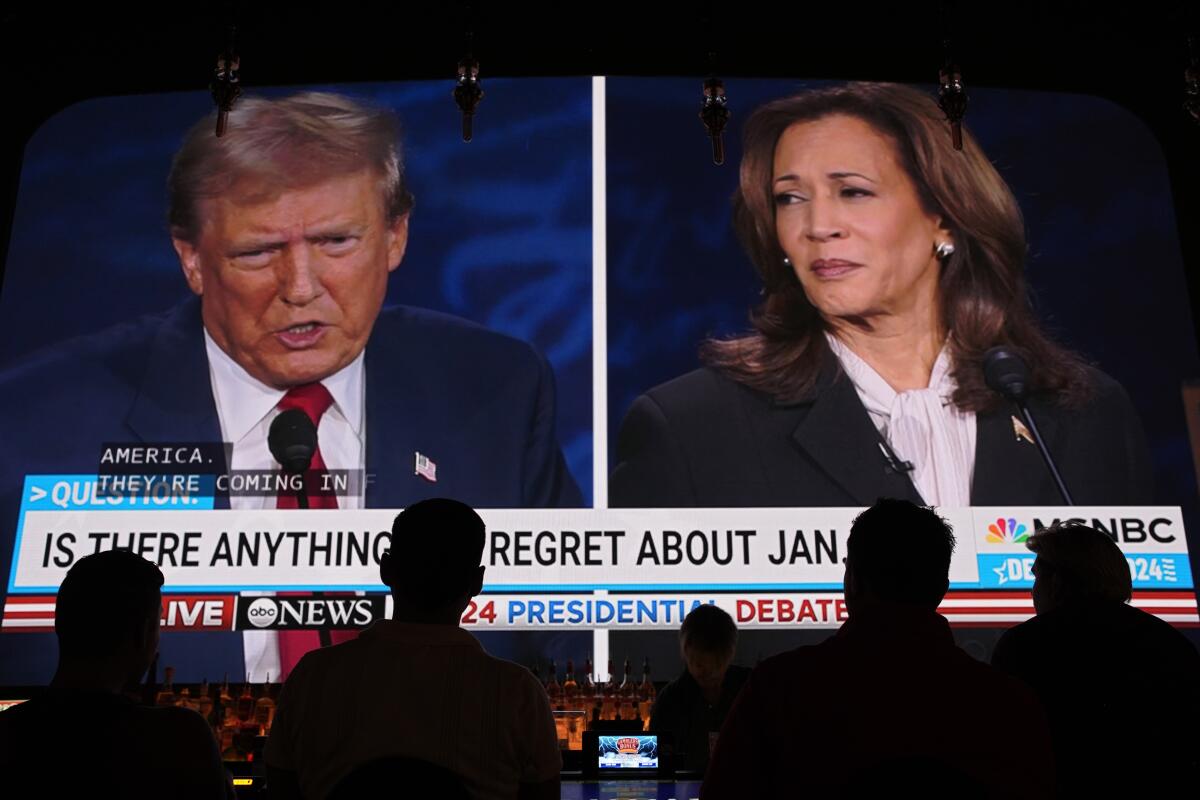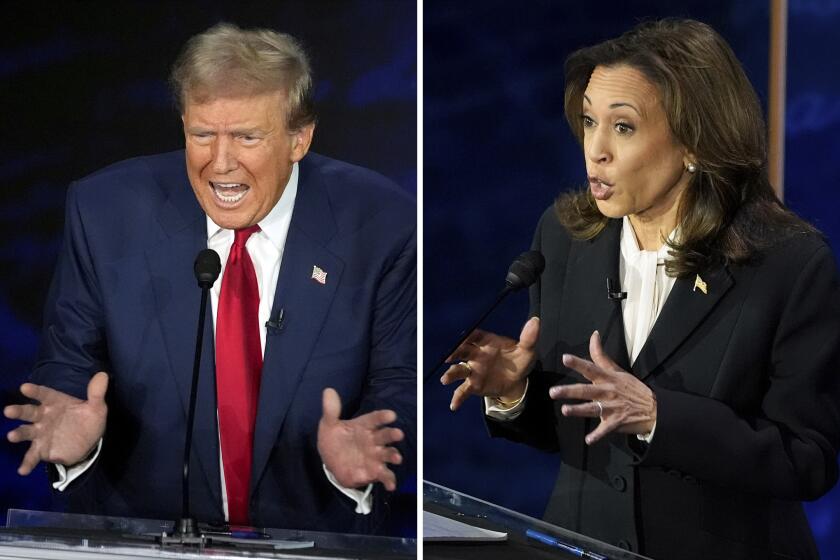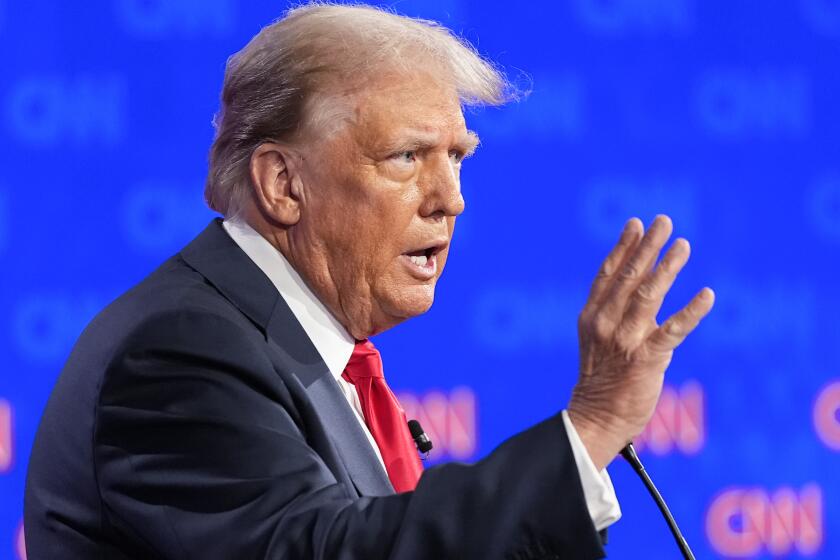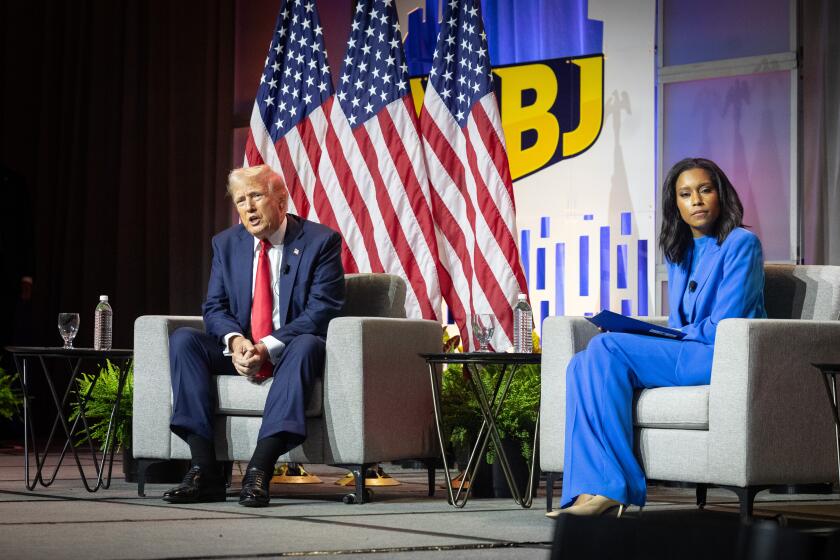Women know showing emotion at work is risky. Harris proves otherwise

- Share via
Her microphone may have been muted when it wasn’t her turn to speak, but Vice President Kamala Harris’ facial expressions spoke volumes during her debate against former President Trump.
There was the arched brow, the hand on chin. Her pitying glance and dismissive head shake were particularly effective in communicating disgust and amusement as her opponent claimed that immigrants were eating their neighbor’s pets and newborn babies were being killed in post-birth abortions.
Polls taken after the faceoff show overwhelmingly that viewers felt she’d bested her competitor, and Trump has since announced he won’t do a second debate with Harris. But according to The Way It’s Always Been Done, she is going about this election in all the wrong ways.
“If she wants to win, Harris needs to train her face not to respond,” wrote GOP pollster Frank Luntz during Tuesday’s debate. “It feeds into a female stereotype and, more importantly, risks offending undecided voters.”
Warning to sensitive swing voters: The subject of Harris and her untrained face may cause discomfort. Read on at your own risk.
Donald Trump and Kamala Harris meet tonight for the first debate of their closely fought presidential contest. Join Times columnists for live updates.

A good poker face has historically been as integral to appearing presidential as a firm handshake or stiff suit. Just take a look at the portraits on U.S. currency. And just to be clear, the term wasn’t coined by Lady Gaga. It’s a descriptor for “an inscrutable face that reveals no hint of a person’s thoughts or feelings.”
Poker face may have helped lend legitimacy to legions of men who ran for office before her, but despite 235 years of presidential stoicism across 46 leaders, Harris does not draw her power from impassivity. On the contrary, the risky move of showing how she feels has turned out to be one of her great strengths.
Trump’s debate technique involves burying opponents with so many falsehoods and outlandish statements that they don’t have time to respond.
During the debate, her body language and expressions helped sell her passion and resolve around heated subjects such as the abortion ban and immigration. And as evident in the countless debate memes that now flood social media, her demonstrative approach knocked Trump on his heels.
When Harris leaned in and suggested viewers attend his rallies to witness firsthand his boring manologues and attendees leaving early, you could almost see steam coming out of his ears. She flashed quizzical glances when he said something patently absurd, looked unimpressed when he hurled insults. She easily pivoted to a commanding stance, looking directly at the camera to address viewers, as if she was narrating the event. It was Harris leaning into her own gregarious nature while deploying a tactical restraint as needed.
Harris’ expressive facial reactions connote progress for those of us who are old enough to remember when women were forbidden from wearing pantsuits on the Senate floor (Barbara Mikulski and Carol Moseley Braun did it anyway in 1993). Laughing, smiling too much or displaying expressions of empathy, disappointment or support at work was interpreted as weakness, immaturity or indecision.
Showing emotion in the workplace was — and still is — seen as a career killer for women aspiring to leadership roles. The unspoken rule: When in doubt, act like the men around the table, even if the company dress code requires you to wear a skirt.
Former President Trump tried to weaponize Vice President Kamala Harris’ mixed-race background. His ploy backfired.
No matter how far we think we’ve come, those attitudes are still a very real part of how Americans choose their leaders. A 2019 study from the Georgetown University Center on Education and the Workforce found that about 13% of men and women have doubts about women’s emotional suitability for politics.
Put another way, that’s one in eight people. It’s true that Hillary Clinton won the popular vote by 2.9 million votes in the 2016 election, but that may have been more about trepidation over Trump’s emotional instability than changing attitudes about a woman in the Oval Office.
When Harris has tried to maintain a poker face, she’s emitted less confidence and power, and frankly, she seems uncomfortable. Last month’s CNN interview was one such instance where she appeared too controlled, too tamped down.
That’s not to say that Harris is best as a loose cannon. She’s not, and besides, that’s Trump’s job. Still no shortage of advice has been offered to Harris about how to win the presidency. It’s come from every major news outlet, every minor media site, every pundit and politician, from Joe Manchin to Chris Christie. Much of it has centered on how to behave.
But if Tuesday’s debate is any indication, she need not listen to any of it. As poster Emily Favreau wrote on X, “She’s mastered the face of simultaneous pity and disgust and every woman knows that is *the* most important combo.”
More to Read
Get the L.A. Times Politics newsletter
Deeply reported insights into legislation, politics and policy from Sacramento, Washington and beyond. In your inbox three times per week.
You may occasionally receive promotional content from the Los Angeles Times.














